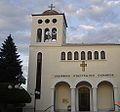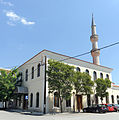Religion in Greece
Religion in Greece (2017)[1]
Religion in Greece is dominated by Christianity, in particular the Greek Orthodox Church, which is within the larger communion of the Eastern Orthodox Church. It represented 90% of the total population in 2015[1] and is constitutionally recognized as the "prevailing religion" of Greece. Religions with smaller numbers of followers include Islam (comprising 2%[1] of the population), Roman Catholicism (comprising 1%[1] of the population), Greek Catholicism, Judaism, Evangelicalism, Hellenic paganism, and Jehovah's Witnesses. Also a small number of Greek atheists exist, not self-identifying as religious. Religion is key part of identity for most Greeks, with 76% of Greeks in a 2015–2017 survey saying that their nationality is defined by Christianity.[2] According to other sources, 81.4% of Greeks identify as Orthodox Christians and 14.7% are atheists.[3]
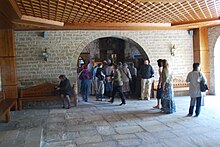
Demographics[edit]
In a survey of the Pew Research Center conducted in 2015 and 2016, 90% of respondents identified as Greek Orthodox, less than 1% was Catholic and 3% was part of other Christian denominations. Muslims comprised 2% and other religions less than 1%. Four percent was religiously unaffiliated.[1]
According to research polls in 2022, 81-90% of the population identified as Greek Orthodox, 4-15% as atheist, and 2% as Muslim.[4]
Christianity[edit]
Eastern Orthodoxy[edit]


The Church of Greece, a member of the Eastern Orthodox Communion, is accorded the status of "prevailing religion" in Greece's constitution. Since 1850, Greek Orthodoxy within Greece is handled by the Church.[5] Its members comprise between 88%[6] and 95–98%[7][8] of the population, the most recent Pew report gave a percentage of 90% as 2015 numbers.[1]
The status of the Orthodox church as the "prevailing religion" is largely based on the role the church played for the preservation of the Greek nation through the years of the Ottoman Empire but also for the role the church played in the Greek War of Independence. As a result, many[who?] attribute to the modern Greek nation an ethnoreligious identity.[9]
Furthermore, the mainstream Orthodox clergy's salaries and pensions are paid for by the State at rates comparable to those of teachers. All Greek students in primary and secondary schools in Greece attend Christian Orthodox instruction, although there is an exemption system for students who do not want to attend, as long as the exemption is requested by both parents.
Catholicism[edit]
Catholics made up less than 1% of the total population in 2015.[1] The Catholic community has increased in size in recent years due to immigration and today number over 200,000.[7]
Roman Catholics[edit]

Roman Catholic Greeks number approximately 50,000[when?][7] and are found all over Greece; the majority, however, live in the Cyclades and the Ionian Islands. The presence of Catholics in the Greek islands is mostly a heritage from the time of the Venetian domination in the Middle Ages. The Catholic community has increased in size in recent years due to immigration and today[when?] number over 200,000.[7]
Greek Catholics[edit]
Catholic Greeks of the Byzantine Rite (Uniates or Unites) number approximately 6,000 nationwide[10] and mostly live in Athens.
Protestantism[edit]
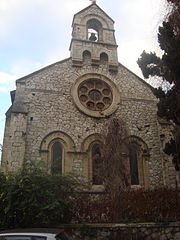
The Protestant population, including Greek Evangelical Church and Free Evangelical Churches, stood at about 23,000 people in 2020 (0.23% of the country).[11] The Free Apostolic Church of the Pentecost was founded by Leonidas Feggos in 1965. The official church, Eastern Orthodox, and the State reluctantly gave permission for Pentecostal churches to operate legally. The process of receiving permission from the Ministry of Education and Religion to operate as a church is becoming easier. Assemblies of God, the International Church of the Foursquare Gospel and other Pentecostal churches of the Greek Synod of Apostolic Church have 12,000 members.[12] The Independent Free Apostolic Church of Pentecost is the biggest Protestant denomination in Greece with 120 churches.[13] There are no official statistics about Free Apostolic Church of Pentecost, but the Orthodox Church estimates the followers at 20,000.[14]
Armenian Church[edit]
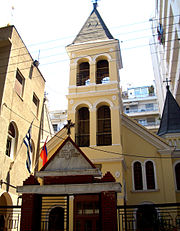
The presence of Armenians in Greece dates back centuries (from the Byzantine period), when Armenians settled in Thessalia, Macedonia, Thrace and the islands of Crete and Corfu for various reasons such as war or business.
The Armenians in Greece acquired the character of a community after the 1920s, when 70,000 to 80,000 survivors of the Armenian genocide fled to Greece. Today, emigration to North America has diminished the Armenian population of Greece. The number now counts for roughly 20,000–35,000 Greco-Armenians.[15]
Islam[edit]
The number of citizens of Greece who are Muslims is estimated to be at 97,604 people or 0.95% of the total population, according to the 1991 census.[16] They live mostly in Western Thrace and are primarily of Slavonic (Pomak) and Romani descent. In 2006, immigrant Muslims were estimated between 200,000 and 300,000.[17] and approximately half of them live in Athens. In 2015, Islam was the religion of 2% of the total population of Greece.[1]
Judaism[edit]

The Jewish community in Greece currently amounts to roughly 5,500 people, concentrated mainly in Athens, Thessaloniki, Larissa, Volos, Chalkis, Ioannina, Trikala and Corfu, while very few remain in Kavala and Rhodes.[18] It is composed largely of two groups, the Romaniotes, Jewish communities dating back to Antiquity, and the Ladino-speaking Sephardim, who arrived from Spain and settled chiefly in Thessaloniki during Ottoman times.
Buddhism[edit]
The number of the followers is not so high amongst the Greeks but it has increased during the last decades because of the immigration of people from East Asia, Sri Lanka and Southeast Asia in Greece. Sri Lankan and Southeast Asian migrant workers working in Greece were usually sent back to their home country to be cremated, due to cremation being banned in Greece until 2006. Today there are three religious centers, in Athens, Thessaloniki and Corinth.
Hinduism[edit]
Hinduism in Greece has a small following. There is a small Hindu community in Athens. There are 25 PIOs and 12 NRIs in the city. On March 1, 2006, the Greek government passed a law allowing cremation. The law was welcomed by the Indian community in Athens.
Sikhism[edit]
Sikhs have been in Greece since the World Wars, as part of the British Indian Army. Guru Nanak is also known to have passed through Greece during one of his journeys. However, actual immigration to Greece began in the 1970s. It reached its peak during the 1990s–2000s. As of 2017, Sikhs are estimated to number 20,000–25,000.[citation needed] There are eight Gurudwaras in Greece, most of them located in Central Greece and only one being in Crete. Gurudwaras are often officially documented as personal properties, community centres or libraries, due to the paperwork needed and also due to the lack of recognition of Sikhs by the Greek Government. Sikhs often face racism and discrimination by the Greek public, who confuse them with Muslims, as well as legal challenges, mostly due to the distinct appearance (The Five Ks). Sikhs are not allowed to wear their turbans and ride motorcycles without helmets, as in the United Kingdom, where their contributions in the war efforts were recognized and they were allowed to not wear helmets.[citation needed] Young Sikhs often face difficulties when recruited for the mandatory conscription in Greece, due to their long hair, beard and turbans. Sikhism is still not an officially recognized religion in Greece and Sikhs are often not included in censuses. Media coverage of Sikhs is minimal and their religion is often reported as "a mix of Hinduism and Islam", whereas it has a separate belief system and many differences. Sikh Gurudwaras have faced numerous attacks including gunshots and Molotov cocktails.[citation needed] On 1 March 2006, the Greek government passed a law allowing cremation,[19] a move welcomed by both Sikhs and Hindus. Since the financial crisis of 2007–2008, many Sikhs have migrated to other countries, such as the United Kingdom, Canada, and Germany.
Hellenic ethnic religion[edit]
Over 2000 people are members of the Supreme Council of Ethnic Hellenes, the foremost organisation of Hellenic ethnic religion.[20][21] Over 100,000 people are "sympathisers".[22] On 9 April 2017 the Hellenic ethnic religion was officially recognized by the Greek state.[23]
Other faiths[edit]
Other minor faiths in Greece include Jehovah's Witnesses (who number about 28,000[24]), Seventh-day Adventists, Mormons and Scientologists. Groups that constitute less than 1 percent of the population includes those of the Baháʼí Faith.[25]
Freedom of religion[edit]
In 2023, the country was scored 3 out of 4 for religious freedom;[26] it was noted that the salaries and pensions of Orthodox clergy are paid for by the state.
Gallery[edit]
-
Catholic church of Thessaloniki
-
Evangelical church in Katerini
-
Evangelical church in Athens
-
Anglican Church of Saint Paul in Athens (arch. Stamatios Kleanthis)
-
Eski Mosque, Komotini
-
Ritual performed by Supreme Council of Ethnikoi Hellenes
See also[edit]
References[edit]
- ^ a b c d e f g h "Religious Belief and National Belonging in Central and Eastern Europe". Pew Research Center. 10 May 2017. Retrieved 2017-09-09.
- ^ "Religion is key part of identity for most Greeks". Kathimerini. Retrieved 2018-11-02.
- ^ "Easter, Faith and Religion in Greece". Kapa Research.
- ^ US State Dept 2022 report
- ^ Kenneth Scott Latourette, Christianity in a Revolutionary Age, II: The Nineteenth Century in Europe: The Protestant and Eastern Churches. (1959) 2: 479–481
- ^ "The Future of World Religions: Population Growth Projections, 2010-2050" (PDF). Pew Research Center. 2015. Retrieved 2023-04-11.
- ^ a b c d "Religious Freedom in Greece (September2002)" (RTF). Greek Helsinki Monitor Minority Rights Group – Greece. Retrieved 2007-09-15.
- ^ "Greece". The World Factbook. Retrieved 2007-09-15.
- ^ Yang and Ebaugh, p.369: "Andrew Greeley (1971) identified three types of relationships in the United States: some religious people who do not hold an ethnic identity; some people who have an ethnic identity but are not religious; and cases in which religion and ethnicity are intertwined. Phillip Hammond and Kee Warner (1993), following Harold J. Abramson (1973), further explicated the 'intertwining relationships" into a typology. First is 'ethnic fusion', where religion is the foundation of ethnicity, or, ethnicity equals religion, such as in the case of the Amish and Jews. The second pattern is that of 'ethnic religion', where religion is one of several foundations of ethnicity. The Greek or Russian Orthodox and the Dutch Reformed are examples of this type. In this pattern, ethnic identification can be claimed without claiming the religious identification but the reverse is rare. The third form, 'religious ethnicity', occurs where an ethnic group is linked to a religious tradition that is shared by other ethnic groups. The Irish, Italian, and Polish Catholics are such cases. In this pattern, religious identification can be claimed without claiming ethnic identification. Hammond and Warner also suggest that the relationship of religion and ethnicity is strongest in 'ethnic fusion' and least strong in 'religious ethnicity'. Recently, some scholars have argued that even Jews' religion and culture (ethnicity) can be distinguished from each other and are separable (Chervyakov, Gitelman, and Shapiro 1997; Gans 1994)."
- ^ "The Eastern Catholic Churches 2017" (PDF). Catholic Near East Welfare Association. Retrieved 2018-02-25.
- ^ The ARDA website, retrieved 2023-08-28
- ^ Synod of Apostolic Church of Christ Archived 2004-12-16 at the Wayback Machine
- ^ Church addresses from the Official Site – in Greek
- ^ Orthodox estimate – in Greek Archived 2008-12-02 at the Wayback Machine
- ^ Bedevyan, Astghik (18 January 2011). Հունաստանի հայ համայնքը պատրաստվում է Հայաստանի նախագահի հետ հանդիպմանը [Armenian community of Greece preparing for the meeting with the Armenian president] (in Armenian). Radio Free Europe/Radio Liberty Armenian Service. Retrieved 5 January 2013.
- ^ Υπουργείο Εξωτερικών, Υπηρεσία Ενημέρωσης: Μουσουλμάνικη μειονότητα Θράκης and Ελληνική Επιτροπή για τη διαχείρηση των υδατικών πόρων: Στοιχεία από την πρόσφατη απογραφή του πληθυσμού
- ^ "International Religious Freedom Report 2006: Greece". US Dept. of State/Bureau of Democracy, Human Rights, and Labor. www.state.gov. 2006-09-15. Retrieved 2007-09-15.
- ^ Short History Of The Jewish Communities In Greece Archived 2007-09-26 at the Wayback Machine (pdf), publicized by the Central Board of Jewish Communities in Greece
- ^ International Religious Freedom Report 2006, Greece
- ^ Newstatesman - The ancient gods of Greece are not extinct
- ^ Telegraph.co.uk - Modern Athenians fight for the right to worship the ancient Greek gods
- ^ "Helena Smith on why some Greeks are worshipping the ancient gods". The Guardian. London.
- ^ "The Greek State Has Finally Recognized the Hellenic Ethnic Religion as a 'Known Religion'". European Congress of Ethnic Religions (ECER), 21 April 2017.
- ^ 2015 Yearbook of Jehovah's Witnesses. Watch Tower Society. p. 180.
- ^ H ΕΚΚΛΗΣΙΑ ΤΗΣ ΕΛΛΑΔΟΣ: Επιτροπές της Ιεράς Συνόδου - ΣΥΝΟΔΙΚΗ ΕΠΙΤΡΟΠΗ ΕΠΙ ΤΩΝ ΑΙΡΕΣΕΩΝ
- ^ Freedom House website, retrieved 2023-08-08
Sources[edit]
- US Department of State Country Reports on Human Rights Practices - 2006: Greece
- Tomkinson, John L., Between Heaven and Earth: The Greek Church, Anagnosis (Athens, 2004) ISBN 960-87186-5-1




